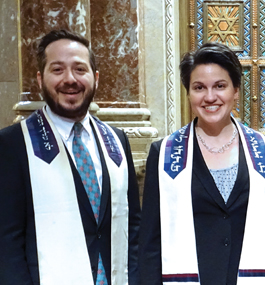Keeping Progressive Values Alive at a Historic House of Worship

Courtesy Congregation Rodeph Shalom
Eli Freedman ’02 and Jill Maderer ’96
From the end of the Civil War to today, Philadelphia’s Congregation Rodeph Shalom, the oldest Ashkenazic synagogue in the Western Hemisphere and a flagship for the Reform movement in American Judaism, has had just nine senior rabbis.
Of the nine, the current leader bears a noteworthy difference: Jill Maderer ’96 is the first woman ever appointed to serve as Rodeph Shalom’s senior rabbi, a role she assumed in 2017.
While hundreds of women have been ordained in the Reform, Reconstructionist and Conservative branches of American Judaism since the 1970s, Maderer is one of only a few who have risen to the top post at such a historic congregation.
“I don’t think I’m so groundbreaking,” Maderer says. “I just think the world is a little slow and it sometimes takes a while for institutions to move forward.”
Her predecessors at Rodeph Shalom have included prominent voices of progressivism in the Reform movement. Her approach echoes their tradition.
“Our connections exist both within and beyond the walls of the synagogue,” she says. “The one stipulation Jewish law provides for the building of a sanctuary is the presence of windows to the outside. With that relationship to the world around us, the words of our prayers are influenced by the life of our city, and our experience of prayer inspires us to go forth into the world empowered by Jewish values.”
Maderer has been a Rodeph Shalom clergy member since her ordination from New York City’s Hebrew Union College-Jewish Institute of Religion in 2001.
As an undergrad, Maderer was the first Reform woman president of Hillel at Brandeis. Today, the university is strongly represented among Rodeph Shalom leaders. Rabbi Eli Freedman ’02 has been a member of the synagogue’s clergy team for nine years, and Philadelphia architect Michael Hauptman ’73 is president of the congregation’s board.
Not surprisingly, Rodeph Shalom’s mission, with its longstanding commitments to diversity, philanthropy and social action, mirrors Brandeis’ core values.
“Brandeis allows students to step up and take on a lot of responsibility outside of class,” says Freedman. “You have to work to shape your own journey. That really helps to develop leaders.”
Under Maderer, Rodeph Shalom has stepped up its social-justice efforts, providing free breakfasts and lunches to needy children in its urban neighborhood during the summer months, and advocating for refugees and asylum seekers.
“We have become much more of a socially involved congregation,” says Hauptman. “That is, in part, thanks to the influence of Brandeis.”
— Heather Salerno
